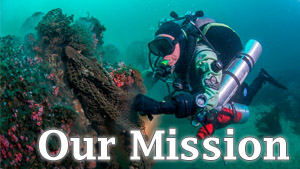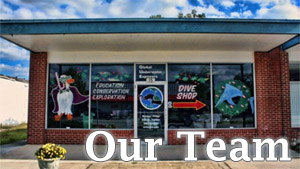Learn More About GUE
Learn More About GUE
Now a well-established 501(c)(3) non-profit organization based in High Springs, Florida, we have developed expansive programs to support our mission with educational opportunities as well as conservation and exploration initiatives around the world.
 |
 |

GUE has become a global leader in scuba education. One inspiration for GUE’s creation was to provide the highest quality diver training programs possible to produce divers who are skilled, competent, and safe—and having fun! Enhanced diving skills increase diver safety, reduce damage to fragile marine ecosystems, and open the door to expanded opportunities for exploration and conservation of diverse underwater environments. Our internationally recognized programs include certifications in everything from beginning recreational diving, to specialties such as drysuit or diver propulsion vehicle use, to the most advanced cave, technical, and rebreather diving. We have incorporated an unprecedented quality control system into our training programs that includes regular requalification for instructors in addition to mandatory student certification renewals and assessments. We are also committed to increasing awareness of, and encouraging support of, our planet’s critical aquatic resources through public outreach in multiple forms. These include supporting the diving community by hosting an annual conference and speaking at conferences around the world, as well as efforts outside our community to involve university researchers, students, and the general public in our mission. We produce a wide range of educational materials including books, videos, and course presentations. GUE publishes a quarterly journal, Quest¸ which includes diverse articles on ecology, equipment and training, exploration, dive-related travel, and more. A water resources video we did in collaboration with the Florida Geologic Survey has been distributed free of charge through the public school system to help encourage environmental awareness and promote responsible water use practices. GUE is always seeking ways to expand our partnerships and resources so that we can reach more people.
 Our leaders and members have advanced scuba experience that enables them to safely reach depths and locations that many divers never could. This means we can offer much-needed assistance to researchers around the world, as well as launch our own unique initiatives.
Small groups of highly skilled GUE divers are working on projects worldwide, with past successes ranging from the discovery and documentation of the 16th century Swedish warship Mars to the recent find of a 12,000-year-old human skeleton in the Mexican Hoyo Negro cave system. The Mars, one of the largest wooden warships ever built, sank in 1564 and remains immaculately preserved at depths of 245ft (75m). The skeleton is the new world's oldest, most intact and genetically preserved human discovered to date. Other projects by GUE include cave exploration in Florida, Mexico, Croatia, China, Australia and more, mine exploration in Germany, and other shipwreck projects like the Cesare Rossarol in Croatia. Our members support work with affiliate groups such as Reef Check, Ghost Fishing, and collaborate on university projects like FAU’s Harbor Branch Oceanographic Institute’s coral reef algae documentation and testing, and Texas State University's Meadows Center’s live shipwreck exploration in the Gulf of Mexico.
Today, the bulk of our conservation and exploration efforts fall under the umbrella of Project Baseline. The overarching mission for Project Baseline is for participants worldwide to survey and record their local aquatic environments with photos, video, and data logs, as a baseline against which future changes can be measured. The results of such efforts are used to build public awareness and support political action. More than 70 projects active in 27 countries currently support Project Baseline's mission.
At home in Florida, our vice president, Todd Kincaid, regularly works to provide information policymakers need to develop sound groundwater protection programs and to take meaningful actions to halt progressive environmental declines and restore Florida’s impacted springs. This includes working to integrate Project Baseline into springs protection efforts conducted by other organizations, regular attendance at water quality meetings to promote responsible land use practices, providing expert testimony on groundwater flow in sensitive aquatic environments, and participation in public events to expand awareness of the ongoing degradation of Florida’s springs and groundwater. Todd also dedicates significant time to advancing Project Baseline’s mission by fostering exploration and conservation expeditions on the Baseline Explorer.
In 2014, we expanded Project Baseline with the GUE Global Expeditions, thanks to the generous support of GlobalSubDive, directed by GUE founding board member Robert Carmichael. Their ship, the Baseline Explorer, equipped with submersibles and able to support techical divers, has been used throughout the Atlantic and Mediterranean to allow explorers and researchers to conduct operations to depths up to 400 feet for surveys of coral reefs, historic shipwrecks, and other significant sites. By using submersibles, scientists, collaborators, and media personnel are able to visit deep locations and oversee scientific surveys and sample collections by our divers. In 2016 and 2017, we will continue to collaborate with researchers and similarly aligned entities to focus our exploration and documentation efforts in the Atlantic, while also preparing for future international projects.
Our leaders and members have advanced scuba experience that enables them to safely reach depths and locations that many divers never could. This means we can offer much-needed assistance to researchers around the world, as well as launch our own unique initiatives.
Small groups of highly skilled GUE divers are working on projects worldwide, with past successes ranging from the discovery and documentation of the 16th century Swedish warship Mars to the recent find of a 12,000-year-old human skeleton in the Mexican Hoyo Negro cave system. The Mars, one of the largest wooden warships ever built, sank in 1564 and remains immaculately preserved at depths of 245ft (75m). The skeleton is the new world's oldest, most intact and genetically preserved human discovered to date. Other projects by GUE include cave exploration in Florida, Mexico, Croatia, China, Australia and more, mine exploration in Germany, and other shipwreck projects like the Cesare Rossarol in Croatia. Our members support work with affiliate groups such as Reef Check, Ghost Fishing, and collaborate on university projects like FAU’s Harbor Branch Oceanographic Institute’s coral reef algae documentation and testing, and Texas State University's Meadows Center’s live shipwreck exploration in the Gulf of Mexico.
Today, the bulk of our conservation and exploration efforts fall under the umbrella of Project Baseline. The overarching mission for Project Baseline is for participants worldwide to survey and record their local aquatic environments with photos, video, and data logs, as a baseline against which future changes can be measured. The results of such efforts are used to build public awareness and support political action. More than 70 projects active in 27 countries currently support Project Baseline's mission.
At home in Florida, our vice president, Todd Kincaid, regularly works to provide information policymakers need to develop sound groundwater protection programs and to take meaningful actions to halt progressive environmental declines and restore Florida’s impacted springs. This includes working to integrate Project Baseline into springs protection efforts conducted by other organizations, regular attendance at water quality meetings to promote responsible land use practices, providing expert testimony on groundwater flow in sensitive aquatic environments, and participation in public events to expand awareness of the ongoing degradation of Florida’s springs and groundwater. Todd also dedicates significant time to advancing Project Baseline’s mission by fostering exploration and conservation expeditions on the Baseline Explorer.
In 2014, we expanded Project Baseline with the GUE Global Expeditions, thanks to the generous support of GlobalSubDive, directed by GUE founding board member Robert Carmichael. Their ship, the Baseline Explorer, equipped with submersibles and able to support techical divers, has been used throughout the Atlantic and Mediterranean to allow explorers and researchers to conduct operations to depths up to 400 feet for surveys of coral reefs, historic shipwrecks, and other significant sites. By using submersibles, scientists, collaborators, and media personnel are able to visit deep locations and oversee scientific surveys and sample collections by our divers. In 2016 and 2017, we will continue to collaborate with researchers and similarly aligned entities to focus our exploration and documentation efforts in the Atlantic, while also preparing for future international projects.
 If you support such education, conservation, and exploration efforts, please consider becoming a GUE member or explore this website for details on other ways you can get involved.
If you support such education, conservation, and exploration efforts, please consider becoming a GUE member or explore this website for details on other ways you can get involved.

